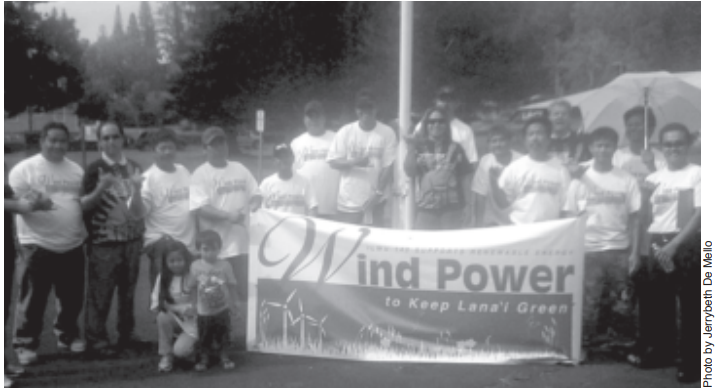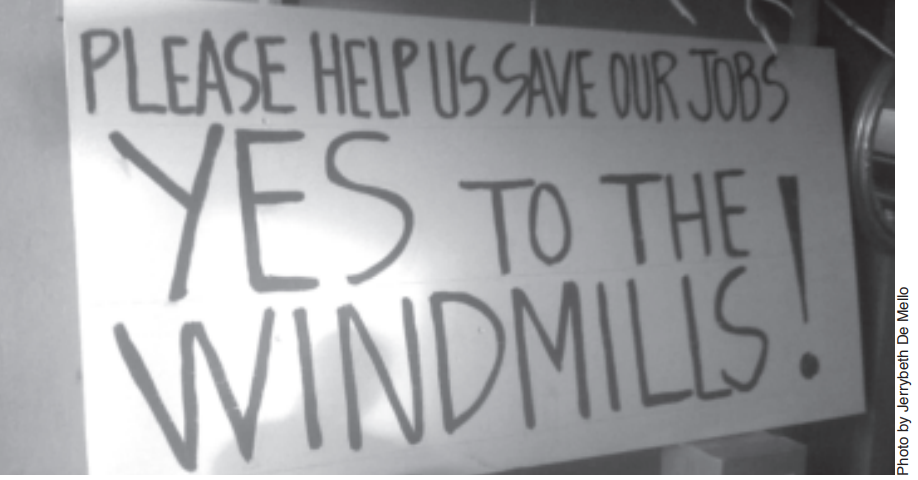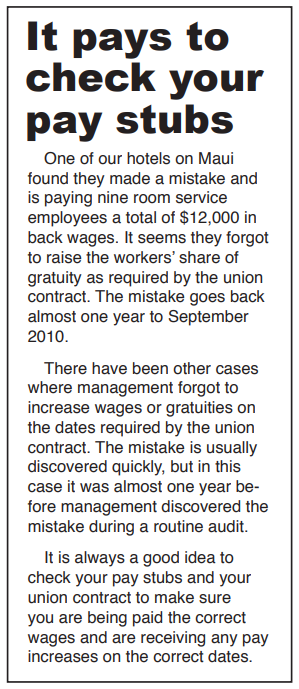
ILWU members held signs and marched showing their support of the wind power project on Lanai during a Public Utilities Commission visit to the island for the review of the Young Brothers freight increase on July 26. Over 200 members urged the PUC to put the wind project on their agenda.
In 2008, a partnership between the state of Hawaii and the U.S. Department of Energy launched the Hawaii Clean Energy Initiative. This initiative was born out of the growing need for the United States to reduce its dependence on imported oil. Hawaii, being one of the most oil dependent states, must take on this challenge to keep our money, jobs and power local.
ILWU supports local energy
The ILWU is supporting a number of renewable energy projects, including wind power on Lanai and Molokai, biofuel development in Ka’u and the Hilo Coast and geothermal on the Big Island.
The Lanai wind power project, as well as other renewable energy projects, are good because it decreases our dependence on costly, environmentallyunfriendly, unstable imported oil. Wind power will provide local jobs. Whether to cultivate and harvest renewable energy crops or work in the factories, these are jobs that the ILWU members can embrace.

Castle & Cooke has spent millions of dollars in planning to build wind power generators on the mountains of Lanai and an undersea cable to bring the electricity to Oahu. The sale of electricity is critical to the financial future of all Castle & Cooke operations on Lanai, which employ well over 600 ILWU members.
Local dollars, local jobs
These renewable energy projects keep money flowing in our economy. Last year we sent $7 billion of our money outside the state to pay for oil. Renewable energy promotes keeping local dollars local, creating local jobs, reducing our carbon footprint and building an industry for our younger generations to develop and improve.
Cut your electric bill
Electric rates in Hawaii are the highest in the nation. Hawaii on average pay 31 cents a kilowatt (kw), with Oahu at 25 cents per kw, Big Island at 36 cents, Maui at 29 cents, Lanai at 37 cents and Kauai at 42 cents per kw. The national average is 11 cents per kw.
While we explore and support these renewable energy projects, we can also take charge of our own energy consumption - and save money doing so. Photovoltaic and solar water heating can cut your electric bill in half or more. These systems pay for themselves in a couple of years. Need to save money before investing in something like solar energy? Changing your lightbulbs to flourescent, turning off your computer when you aren’t using it, turning off lights when you aren’t in the room and taking shorter showers can dramatically reduce your monthly bill.
Take part in our right to “Local Power.” The ILWU has proven that when workers stand together, our lives improve. Together we can build “Local Power.”
Worker democracy in Norway —continued from page 5
positions. If an employee suffers reduced capacity for work as a result of an accident, sickness, or fatigue, the employer shall, as far as possible, implement the necessary measures to enable the employee to retain or be given suitable work. If it is necessary to transfer an employee to other work, the employee and the employee’s elected representatives shall be consulted before deciding the matter.
Schedules and rules are negotiated
Work schedules shall be discussed with the employee’s elected representatives as early as possible and at least two weeks prior to implementation. House or staff rules shall be negotiated with the employee’s elected representatives. If there is no union, the employees shall select five representatives to negotiate with the employer.
If there is no agreement on the rules, the employer shall submit their draft along with the counter rules from the employees to the Norwegian Labour Inspection Authority who must approve the rules.
Protected from dismissal
Before making a decision to dismiss an employee, the employer must discuss the matter with the employee and the employee’s elected representative unless the employee does not want the representative involved.
All employment relationships shall have a written contract of employment. An employee may have the assistance of an elected representative or other representative when drafting or amending the contract of employment.
Employees may not be dismissed unless this is objectively justified on the basis of circumstances relating to the undertaking, the employer or the employee. When deciding whether a dismissal is objectively justified by curtailed operations or rationalization measures, the needs of the undertaking shall be weighed against the disadvantage caused by the dismissal for the individual employee.
Limits on subcontracting
Dismissal due to contracting out of the undertaking’s ordinary operations to a third party is not objectively justified unless it is absolutely essential in order to maintain the continued operation of the undertaking.
An employee who is wholly or partly absent from work owing to accident or illness may not be dismissed for that reason during the first 12 months after becoming unable to work. If an employment relationship has been legally terminated, an employee may remain in the post as long as negotiations are in progress.
Owners face fines and jail for violations
Any proprietor or person managing an undertaking who willfully or negligently breaches the provisions of this Act shall be liable to a fine, imprisonment for up to three months or both. In the event of particularly aggravating circumstances the penalty may be up to two years’ imprisonment.
Employees are also liable to a fine and up to 3 months imprisonment or one year for serious offenses.
Not in the USA
Almost none of these rights and benefits are required by law in the United States.
Unionized workers have successfully negotiated some of these rights and benefits into their contracts, but these would apply only to those individual employers covered by the union contract.

